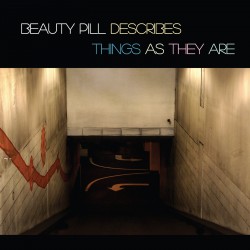Beauty Pill’s exuberant and adventurous new album, Beauty Pill Describes Things As They Are, fully communicates the D.C. band’s depth of experience, from its Dischord Records post-hardcore roots to bandleader Chad Clark’s embrace of digital music tech. But it’s useful to know the project’s thick backstory, too.
Clark had open-heart surgery in 2008 as a result of viral cardiomyopathy, but by 2011 Beauty Pill was fully operational again, and the band recorded tracks publicly at Artisphere in Arlington, Virginia. Those sounds are the core of Beauty Pill Describes Things As They Are, and the band will return to the venue later this week to perform the album, which Butterscotch Records released last week, in its entirety. (The shows are sold out.)
 Clark also became a thoughtful, sometimes prickly presence on Twitter along the way, proving that besides his command of sonics (he’s an in-demand producer), he’s also invested in the power of words. And the lyrics on Beauty Pill Describes Things As They Are are loaded with thoughts on mortality, authority, race, relationships and materialism. Clark says the vocals — he and multi-instrumentalist Jean Cook both sing, but the words are usually his — are intentionally up-front in the mix.
Clark also became a thoughtful, sometimes prickly presence on Twitter along the way, proving that besides his command of sonics (he’s an in-demand producer), he’s also invested in the power of words. And the lyrics on Beauty Pill Describes Things As They Are are loaded with thoughts on mortality, authority, race, relationships and materialism. Clark says the vocals — he and multi-instrumentalist Jean Cook both sing, but the words are usually his — are intentionally up-front in the mix.
“I’m never interested in being willfully obscure. I’m an artist who is always interested in being understood,” he says. “And that doesn’t mean that I don’t enjoy the wild, subjective takes people will have on different songs. That’s what is beautiful about art. But I’m definitely never purposefully evading anyone.”
And with that in mind, he enthusiastically agreed to explain five sets of lyrics — and one broader lyrical choice — from the album.
This interview has been edited for clarity and length.
Song: “When Cornered” (stream entire song below)
Lyrics: We like coronation with our famine/Not so much a dearth of goods/But a surplus of desire
Context: The song was written during the George W. Bush administration.
Chad Clark: That’s kind of the American condition, isn’t it? We’re not actually suffering — like, my iPhone is about run out, and that’s a problem, but it’s a f*****g iPhone. Our ideas of scarcity and our ideas of suffering — the scale is pretty messed up. I guess that [line is] a more lyrical way of saying “First World problems.”
Song: “Exit Without Saving” (stream entire song below)
Lyrics: The devil is just two kids in a coat/That come to you at night/”We’ve established what you are/Now we’re just haggling over the price”
Context: That quoted material is part of a quip attributed to many famous men, but with no definitive provenance. A short version: Man asks woman, “Would you sleep with me for $1 million?” Woman says yes. Man then asks, “What about for $25?” She then says, “What kind of woman do you think I am?” Man replies with the quoted line.
Chad Clark: That song is about being haunted or having been trapped. The title, which I think a lot of people [think] refers to a Microsoft Word document, but it’s actually kind of a darker, richer thing — or at least I hope. “The devil is just two kids in a coat” is sort of my way of saying that this pernicious agent of your destruction is actually nothing you need to fear — you can overcome it. I get asked a lot about that song, and that song is probably closest to the least-conscious writing that I do. It’s a pretty wildly imagistic song.
Song: “Drapetomania!” (stream entire song below)
Lyrics: It’s not Natalya Estemirova/It’s not Cheyenne, Arapaho/A well-lit nowhere/See you tomorrow!
Context: Estemirova, a Russian human rights campaigner, was murdered; the Cheyenne and Arapaho were allied Native American tribes on the plains. Other lyrics refer to “the heart of wildest Caucasia.” (Drapetomania itself was a diagnosis of mental illness given to slaves who wanted to free their masters.)
Chad Clark: Another really, really wild song. The chorus is generally referring to large human struggles, large conflicts — the Tupamaros, Cheyenne, Arapaho. But the song is kind of a description of the suburbs. And so what I’m saying is that it’s not Natalya Estemirova, it’s not the Tupamaros, it’s not these grand conflicts or large-scale struggle.
Song: “Steven & Tiwonge” (stream entire song below)
Lyrics: Slide the bureau against the door/Buys us 30 seconds or so/Leave the locket on the nightstand/Then out the window
Context: Steven and Tiwonge were a gay couple in Malawi sentenced to 14 years in prison for their sexuality. The song imagines each man’s thoughts as the police descend: Steven is inclined to say the relationship is over, but Tiwonge believes it can last.
Chad Clark: It’s something that Beauty Pill has done in the past — there’s a song called “Prison Song,” which uses a similar device of shifting words very slightly to radically change the meaning as the song goes. We’re pretty interested in duality. I think it’s one of the reasons why there’s always been me and a female singer in the band.
Each of those verses is written from the point of view of a different member of the couple. This is totally speculative fiction — these are people I’ve never met and never will meet, and I’m writing about them from afar. It seemed more interesting to me, rather than writing a protest song, to talk about something I find interesting, which is that usually in couples, there’s someone who’s more of a risk-taker, and someone who is a little bit more risk-averse.
I’ve done some research on them since I’ve written the song, and my speculation seems to be not entirely off-base. They did end up breaking up, and they have different perspectives on their relationship now.
Song: “Near Miss Stories” (stream entire song below)
Lyrics: One of these beats of your heart is gonna be the last/The surgeon once practiced on a blood orange in an art class
Context: Clark is fascinated by the popularity of near-miss stories. The line about the orange is “actually true,” he says.
Chad Clark: It’s not a diss to my surgeon — my surgeon was fantastic. But it’s one of the things that he told — or someone told me — before the surgery. I think they were trying to point out how delicate and almost artistic surgery is. Which is interesting to hear right before you go under the knife. I don’t remember if it was him who said it, or maybe a nurse. But I remember thinking, “I’m not a f*****g blood orange.” Why would that be comforting to me? I’m trying to let the listener in on the absurdity of my circumstance and the vulnerability of my circumstance.
Bandwidth: Mortality is a pretty absurd thing sometimes.
Chad Clark: Yes! It’s like there’s a moment in Trading Places when Eddie Murphy looks at the camera … and he just totally breaks the fourth wall. So that lyric is a little bit of that kind of thing. But also, it is a wondrous fact that you could prepare for heart surgery by disassembling an orange — that is pretty amazing and beautiful in a certain kind of way.
The line from that song that I really love is the chorus, which is a quote from my dad: “If you see something you want, let me know and I’ll show you how to live without it.” In that case, that’s my dad being a hard-ass. But I think it’s a really heavy and beautiful line. And that’s why I turned it around [later in the song] to, “You already know how to live without it.” That song was written kind of with a longing. That’s one of the fantasies that you have a lot when you go through a serious illness, or you go through any kind of calamity. You think forward. You’re like, “Someday, this is just gonna be a story, and I’m just going to tell everybody, my 2008 was so f*****g crazy, and thank God that’s all over now.”
Bonus question:
Bandwidth: As far as I can tell, the only profanity on the album is the F word. And you use it and deploy it with pretty deliberate effect.
Chad Clark: I did not realize how much I curse on the record until people brought it up to me: “You kinda curse a lot.” I don’t really have anything heavy to say about it. Another story about my dad: When I was growing up, my dad told me and my brother, we could use [the F word], we could curse as much as we wanted, but we had to choose only one application of [it]. Like, “If you wanna use it just as an exclamation, when you’re pissed off about something, that’s fine, but then you can’t use it for sex. If you want to use it for sex, you can use it for sex, but then you can’t just use it as an angry thing.”
Years later, I told my dad, “You know know how you told us that we could only say [the F word] one way?” And he totally had forgotten. He was like, “Oh man, I was just totally making that up as I was going along.” I remember thinking, “What a profound rule. What an interesting rule” — my dad wanting us to be precise with language. And he was absolutely like, “I really don’t care. I was just trying to get you guys to stop cursing so much.”
That’s my little story about cursing. I hope that the cursing on the record isn’t unwelcome. I hope it’s not one of those things that seems compulsive or becomes irritating or unhappy for people. I truly didn’t realize it happens as much as it apparently does. But yeah, people have brought that up recently, and I don’t know what to say. There you have it.
Beauty Pill plays Artisphere April 30 to May 2. The shows are sold out. Beauty Pill Describes Things As They Are is available via Butterscotch Records.


